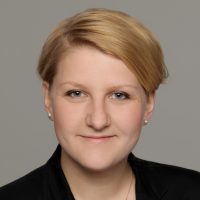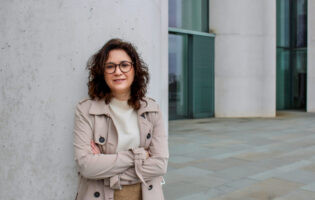Despite Trump, Germany Should Not Fall for “Equidistance”

Liana Fix
Council on Foreign Relations
Liana Fix is a fellow for Europe at the Council on Foreign Relations (CFR). She is a historian and political scientist, with expertise in German and European foreign and security policy, European security, transatlantic relations, Russia, and Eastern Europe. She is also the author of A New German Power? Germany’s Role in European Russia Policy (Palgrave Macmillan, 2021). Dr. Fix’s work focuses on German domestic and foreign policy, the European Union, transatlantic relations, and Europe’s relations with Russia and China.
Prior to joining CFR, Dr. Fix was program director for international affairs at Körber-Stiftung in Berlin. She was also a resident fellow at the German Marshall Fund in Washington, DC, and a DAAD/AICGS fellow at the American Institute for Contemporary German Studies. From 2018 to 2019, she was a fellow for global governance futures at the Robert Bosch Foundation Multilateral Dialogues. From 2014 to 2016, Dr. Fix was a doctoral fellow at the German Institute for International and Security Affairs and associate fellow at the German Council on Foreign Relations. From 2012 to 2013, Dr. Fix worked as a Mercator fellow for international affairs at the German Federal Foreign Office, the EU Delegation in Tbilisi, and the Carnegie Moscow Center.
Dr. Fix has contributed essays, policy papers, and articles to peer-reviewed journals including Foreign Affairs, Foreign Policy, and the Washington Quarterly, among others. She is also a frequent contributor to international and German-language media.
Dr. Fix received her MSc in theory and history of international relations from the London School of Economics and Political Science and her PhD in political science from the Justus Liebig University Giessen. She is a member of the European Leadership Network Younger Generation Leaders Network on Euro-Atlantic Security and of Women in International Security.
The election of Donald Trump as the 45th president of the United States has sent shockwaves through Berlin. Among others, Trump’s sympathetic gestures toward Russia put Germany in an awkward position: In an ironic twist of events, Germany now suddenly seems to be the hawk in relations with Russia, while Washington wants to cultivate a new friendly relationship with Putin. For some commentators, the logical consequence is to urgently adjust policy toward Russia—in order not to be outrun by Washington—and at the same time to seek more distance to a United States under Trump—the old idea of “equidistance” to Washington and Moscow.
“Equidistance” was used during Cold War times to designate an alternative third way for a country: not to align itself with the bloc formation of the superpowers, but to keep equal distance to Washington and Moscow, for instance through neutrality. For Merkel, the necessity of close German and European relations to the United States is sacrosanct and equidistance is not an option for German foreign policy. But with a President Trump in the White House, the concept could gain renewed attractiveness, in particular in the (center-) left political spectrum. If the United States is no longer the role model it used to be, why not choose a middle position between Washington and Moscow?
This is dangerous thinking for German foreign policy for three reasons. First, Germany relies—as do most other European states—on the United States and NATO for its security. While efforts are underway to strengthen common European security and defense policy, this can only be an addition, not a substitute, for the role of NATO and the U.S. Second, equidistance equates Washington and Moscow in a dangerous relativization. In contrast to Russia, an autocratic kleptocracy, the U.S. is (despite all concerns about the new administration) still a liberal democratic system and the transatlantic relationship is based on values as much as on interests, different to relations with Russia. Last but not least, the idea of equidistance evokes associations of a “third” German way in international politics, which has more than once proven to be a dangerous deviation.
Despite Trump, “Westbindung”—being firmly rooted in the Western community and Western values—must remain the fundamental pillar of Germany’s foreign policy toward Russia and in general. Even more so at times when Western structures seem to crumble, it is the task of German politicians and German civil society to contribute upholding these structures and values, after having benefitted for almost seventy years from the Western liberal order. Although Germany alone cannot provide the military “hard power” in security policy to take on the role of the U.S. as liberal hegemon, there is a lot Germany can contribute in terms of “soft power.” As one of the most popular countries in the world and a powerful economic player, Germany should not become disillusioned or cynical by whatever comes from the new U.S. administration, but rely on its own instruments and strengths and become, if not the leader, at least the core and center of the Western “Weltanschauung.”
In concrete terms, this implies a number of daunting tasks: to continue a principles-based approach in policy toward Russia, and use economic instruments and sanctions to enforce it. Even if the new U.S. administration opts for sanctions removal, Germany must act to uphold European unity on sanctions, despite a potentially sanctions-skeptic new French administration next spring. But the greatest challenge for politicians and citizens alike, in public and private life, will be to contain the “performative effects” of the Trump election and other populist successes for the parliamentary elections in Germany in September 2017. A good example how civil society can play an active role is “Die offene Gesellschaft,” a collaborative project supporting and promoting activities for an open, free, and liberal society. We need more such initiatives. Instead of pondering geopolitical options for German foreign policy in a new Trump era, Germany must start fighting for what is worth it: a liberal international order abroad and an open society at home.









